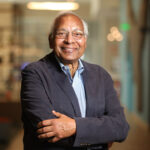Frontiers of Knowledge Award goes to Anil Jain and Michael I. Jordan for their core contributions in developing biometrics and AI
The BBVA Foundation has granted its Frontiers of Knowledge Award in Information and Communication Technologies to Anil K. Jain (Michigan State University, United States) and Michael I. Jordan (University of California, Berkeley, United States) for their “core contributions” to machine learning, which have unlocked developments in biometrics and artificial intelligence.

Jain’s research has focused on pattern recognition, leading to “monumental contributions” – in the words of the committee – in recognizing people through fingerprints or face ID, with technologies that are now being massively deployed in the security domain, both in criminal investigations and for accessing mobile phones and other electronic devices.
In parallel, Jordan’s independent efforts in the machine learning field provided unified algorithms for statistical and probabilistic inference, laying the mathematical foundations for AI models such as those powering ChatGPT, and the development of recommender systems, like the one used by Amazon, that inform the economic decision-making of both consumers and businesses.
For the committee, the contributions of Jain and Jordan have had a transformative impact “on everyday life,” leaving “an indelible stamp on the fabric of today’s – and tomorrow’s – information-rich society.”
Jain: the foundations of biometric technologies
After studying in his native India, Anil Jain began his research career at Ohio State University working on automated systems able to distinguish whether a military plane in the air was the enemy’s or “one of ours.” From there he went on to study questions like how to detect signs of disease in medical images, or how to use a computer to recognize the destination address of postal mail. But none of these applications of the underlying technique of pattern recognition took him as far as his work on fingerprint and face recognition, where he has become a world-leading authority.
This technology, now in wide use in the touch ID features of our mobile phones and as a forensic tool in criminal investigations, has also been key to developing an identification system for the population of India, which until less than two decades ago did not have a unified registry of citizens.

Anil K. Jain (Michigan State University, United States).
Jain was also a pioneer in quantifying the uniqueness of a person’s fingerprints. Though no one thought it possible, he was able to demonstrate that the tiny distortion caused by the tip of a finger being pressed against a surface gave rise to the slight probability that two people’s fingerprints could be misidentified as the same.
The awardee also looked at the stability or persistence of fingerprints over time, providing first-time confirmation with solid data of this popular belief. To do so, he used a data set of 40,000 repeat offenders stretching over 12 years, during which their fingerprints were taken on each occasion they were arrested. What he found lent substance to the unproven conjecture that they do not change over time.
For Jain, the main challenge facing biometrics today is to further improve the accuracy of biometrics and the security of the databases that underpin these systems.
Algorithms that drive generative artificial intelligence
Michael I. Jordan has developed mathematical and computational techniques that underpin a wealth of AI applications. From restaurant recommendation systems to generative language models like ChatGPT or decision support tools in the business domain, Jordan’s advances have been instrumental in enabling their real-life application.
The laureate was one of the pioneers in the development of variational inference methods, in which the solution to a mathematical problem that is not feasible to solve with the available computational resources is approximated, reducing it to an optimization problem in the 1990s. This technique is a central component of deep learning applications such as ChatGPT's generative artificial intelligence and other large language models.

Michael I. Jordan (University of California, Berkeley, United States)
In the 2000s, Jordan turned his attention to multiplying the possibilities of machine learning by running programs on hundreds or thousands of computers instead of just one. The algorithms he devised to enable such large-scale distributed computing led to the setup of the company Anyscale, whose Ray platform is the basis for ChatGPT, numerous e-commerce firms and many other deep learning applications.
Among the awardee’s more recent interests has been the application of machine learning to economics and road traffic.
In contexts where multiple actors are entrusting decisions to the same system, recommender systems must be able to adapt to avoid congestion. For instance, a GPS app being used in a town with hundreds of thousands of inhabitants could recommend the same route to the airport to a thousand users at once, causing traffic hold-ups. Jordan is working to develop machine learning systems that overcome this problem, reflecting people’s preferences while allowing them to collaborate within the same system (for instance, choosing alternative routes so as to generate lighter traffic on each).
He also works on the development of algorithms applied to decision making in industry and business. “Today’s machine learning is not that good at decision-making under uncertainty,” the awardee points out. “Uncertainty and the need to reduce it is everywhere, from the decisions made by individual microeconomic agents in local contexts to the dynamics of global markets.
“I think what artificial intelligence has to do is help us connect better with each other and collaborate more effectively. I want to empower humans, not have the AI tell humans what to do.”